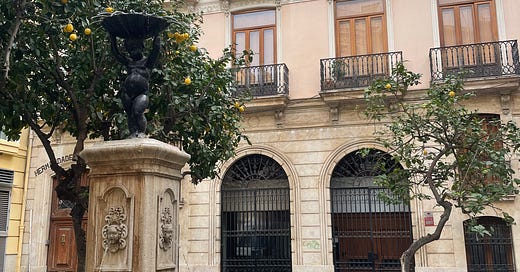Apologies for not writing last week, I’m leaning into the culture of promises of ‘mañana’ and I was at a work(ish) event on Wednesday. Anyway, yesterday, I witnessed a 1,000-year-old tradition, known as Tribunal de las Aguas de la Vega de Valencia.
The Tribunal de las Aguas de la Vega de Valencia is an ancient court that resolves water disputes in the region. The tribunal takes place every Thursday at noon on the steps of Valencia’s main cathedral, and eight elected farmers, dressed in black robes and sitting on ornately carved wooden chairs, discuss disputes over water usage and land rights. They hold the talks in Valencian and deliver final, binding decisions on the spot to land-owners who raise disputes. The tradition is both fascinating to observe and very much relevant today in light of last year's devastating floods.
The Tribunal de las Aguas de la Vega de Valencia is considered the oldest judicial institution in Europe, dating back at least 1,000 years to the 10th century, during the time of Al-Andalus (Muslim rule in Spain). Al-Andalus rulers introduced an advanced irrigation system in the fertile lands surrounding Valencia, using an intricate network of acequias (irrigation canals). To ensure fair distribution of water, they established a tribunal where local farmers could settle disputes quickly and efficiently.
After the Christian Reconquista in 1238, King James I of Aragon respected and preserved the tribunal, integrating it into the legal framework of the Kingdom of Valencia. Over the centuries, the tribunal has remained unchanged, maintaining its role as a fast, impartial, and traditional justice system for irrigation disputes.
I loved attending. I loved observing the fascination of the crowd watching intently, the absolute decisiveness of the tribunal and the dedication to tradition. Water plays a huge role in Valencia and its history, arguably the driving force of life here, and holding a weekly trial about water division in the region is a testament to its potency.
Procedures of the Tribunal
The tribunal follows a simple, oral, and immediate procedure. Every Thursday at noon, the tribunal convenes at the Puerta de los Apóstoles (Apostles' Gate) of Valencia Cathedral. This has been the practice for centuries. It’s a bit of a blink and you miss it type of event, often over in less than ten minutes. Arrive at least five minutes early to reserve a spot and to give yourself the best chance of understanding what is going on.
The tribunal is composed of eight elected members, one from each major irrigation canal (acequia) of the Turia River. These members are local farmers, chosen for their deep knowledge of irrigation customs. The members hear cases from farmers who have complaints about water use or irrigation violations appear before the tribunal. The president of the tribunal calls out: "Denunciats de la sèquia de..." (Accused from the irrigation canal of...) to summon the accused.
It’s a very simple procedure. There are no lawyers, no written documents, and no bureaucracy. The farmers explain their disputes verbally, and both sides present their arguments. The tribunal members deliberate briefly and issue a binding verdict on the spot. The accused can either be acquitted or fined. The ruling is final and cannot be appealed.
Why is the Tribunal Unique?
It is entirely oral—no written records or legal documents are involved. Decisions are independent from modern judicial systems but officially recognised. In fact, decisions are final and cannot be overturned by any court.
The tribunal is a direct descendant of medieval and Islamic water law, making it a rare example of continuous legal tradition. So rare it was declared an Intangible Cultural Heritage of Humanity by UNESCO in 2009, highlighting its cultural and historical significance.
This institution has survived for over a thousand years, and even today, it continues to resolve irrigation disputes in Valencia’s farming communities efficiently, proving the effectiveness of traditional community-based justice.




